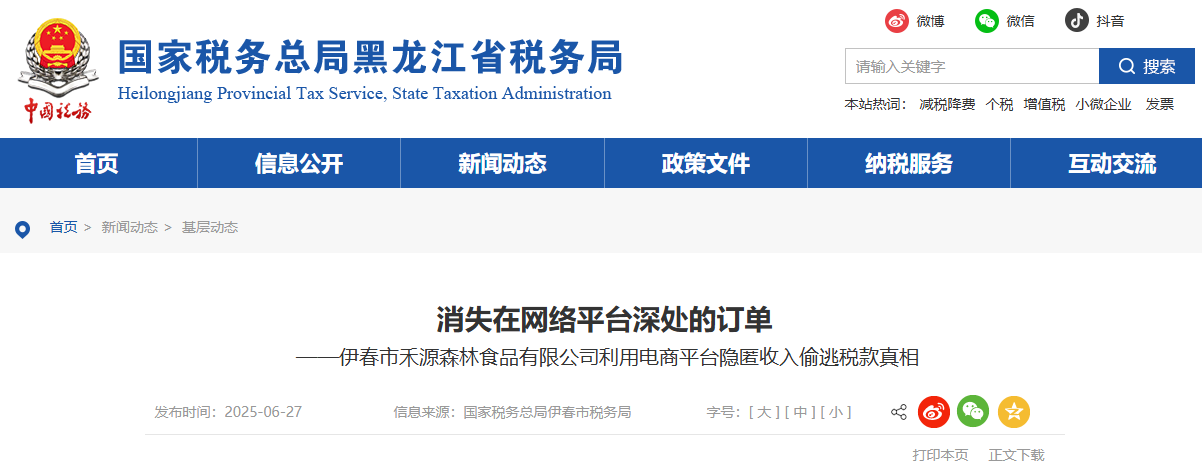E-commerce companies' tax evasion and false invoicing risks from three cases
Editor's note: With the development of e-commerce, online sales and other business models are becoming increasingly mature. However, in practice, some e-commerce companies use various methods to conceal income or evade taxes through false invoicing. Based on this, this article will reveal the causes and manifestations of common tax risks in e-commerce enterprises, analyze relevant legal provisions, and provide corresponding suggestions for tax compliance for e-commerce enterprises.
Ⅰ. Dynamic observation: Tax-related incidents in e-commerce enterprises are frequent
(Ⅰ) Tax evasion through concealing income

Case 1: The third inspection bureau of the tax bureau of the State Administration of Taxation investigated and dealt with the tax evasion case of Heyuan The Forest Food Co., Ltd. The company involved obtained sales revenue of 2 million yuan through e-commerce platforms, but did not declare it in accordance with the law. The tax authorities compared the operating enterprises in the same region, scale, and industry, and found that the enterprises involved had hidden income issues. In the end, the tax authorities found that the company concealed sales revenue from e-commerce platforms, made false declarations, and underpaid a total of 448,100 yuan in value-added tax and other taxes.

Case 2: The Zunyi City Taxation Bureau of the Second Inspection Bureau of the State Administration of Taxation lawfully investigated a case of a sauce liquor sales enterprise through e-commerce channels concealing income and evading taxes. The enterprise sold liquor through e-commerce channels and prepared complete accounting records. Before the tax inspection, it deleted relevant online transaction data and used third-party payment platforms to conceal sales income. The tax authorities confirmed through the e-commerce platform's backend data that the enterprise had evaded more than 2 million yuan in taxes.
(Ⅱ) Tax evasion through fraudulent invoicing

The State Administration of Taxation has announced a major case of online anchor management agencies colluding with illegal intermediaries to falsely open, evade taxes, and deceive subsidies. According to the investigation, Guangdong Huizhou Gaofushuai Cultural Media Co., Ltd. issued 1,196 false invoices through the establishment of shell companies, with a total tax value of 226 million yuan, evading more than 32 million yuan in personal income tax for more than 700 anchors, and the company underpaid a total of approximately 21 million yuan in taxes and fees. The Huizhou Taxation Bureau's Inspection Bureau imposed penalties on the company in accordance with the law.
II. Forms and Causes of Tax Risks for E-commerce Enterprises
Due to the relatively relaxed supervision measures in the early stage of e-commerce enterprises, mainly adopting electronic trading models, there have been frequent tax violations by e-commerce enterprises. Through the analysis of these illegal cases, it was found that the illegal behavior of the involved enterprises mostly involved concealing income and issuing fake invoices, revealing the causes of tax risks in e-commerce enterprises.
(Ⅰ)The main manifestations of tax risks for e-commerce enterprises
1、The Hide income in various ways
In practice, enterprises conceal their income obtained through e-commerce platforms in various ways. For example, some implicated enterprises transfer part of their income to other private accounts through third-party platforms, resulting in fewer funds received in the company's account and thus achieving the purpose of paying less taxes; some enterprises split their income in various ways, concealing part of it and only paying taxes on a portion of the income.
2. Underreporting costs through fake invoicing
Some e-commerce companies achieve the purpose of reducing costs for themselves or related parties by falsely issuing value-added tax special invoices or ordinary invoices, using the invoices to obtain funds or change the nature of transactions, and then evading taxes through the invoices. For example, in the aforementioned case, the involved companies evaded taxes by falsely issuing invoices.
(Ⅱ)Analysis of the causes of tax risk in e-commerce enterprises
E-commerce enterprises have characteristics of virtualization and digitization in transactions, making it difficult for tax authorities to collect tax-related information such as transaction data and account flow. In addition, e-commerce platforms did not have the obligation to submit tax-related information to tax authorities in the past, leading to loopholes in tax supervision and triggering the issue of e-commerce enterprises concealing income and tax evasion. With the implementation of new tax policies, all transaction data of e-commerce enterprises are under the supervision of tax authorities. For example, after the release of the "Regulations on Tax Information Reporting by Internet Platform Enterprises," domestic e-commerce platforms have the obligation to submit tax-related information of e-commerce enterprises within the platform to the national tax authorities. Under the requirements of this regulation, e-commerce platforms will submit relevant information such as online sales revenue of e-commerce enterprises to the tax authorities, enabling real-time supervision of the online sales revenue of e-commerce enterprises by the tax authorities.
Ⅲ. Main tax risks for e-commerce enterprises
E-commerce enterprises that conceal income and issue fake invoices illegally to evade taxes will face administrative and even criminal liability risks.
First, on the risk of administrative responsibility. Firstly, the behavior of the involved enterprise violates Article 63, Paragraph 1 of the "Tax Collection and Administration Law" and will be deemed as tax evasion by the tax authorities. The relevant taxes, late fees, and fines of 0.5 to 5 times the amount of taxes not paid or underpaid by the tax authorities will be recovered. Secondly, the behavior of the involved company issuing false invoices violates Article 21 and Article 35 of the "Invoice Management Measures", and the involved company may face a maximum fine of 500,000 yuan. Thirdly, in addition to facing administrative liability risks such as tax recovery and fines, the involved enterprises will also face the risk of a decrease in their tax credit rating, which will affect their subsequent business activities.
Secondly, in terms of criminal risk. First, after the behavior of concealing income by enterprises is classified as tax evasion, it may lead to criminal liability risks. According to Article 201 of the Criminal Law and relevant judicial interpretations, if the amount of tax evasion by the involved enterprise accounts for more than 10% of the tax payable and the amount of tax evasion exceeds 100,000 yuan, they will face criminal responsibility. Secondly, the act of issuing false invoices by enterprises may violate Article 205 and Article 205-1 of the Criminal Law, as well as the Interpretation of the Supreme People's Court and the Supreme People's Procuratorate on Several Issues Concerning the Application of Laws in Handling Criminal Cases of Harmful Tax Collection and Management (Judicial Interpretation [2024] 4 No.) Relevant regulations will face corresponding criminal penalties.
Ⅳ. Countermeasures for e-commerce enterprises
E-commerce enterprises should first take related tax risks seriously and put forward legitimate and reasonable defense reasons; secondly, e-commerce enterprises should also establish tax risk prevention mechanisms from various aspects such as tax systems.
First, at the level of legal responsibility. When the illegal behavior of an e-commerce company is discovered, if the e-commerce company has legitimate and reasonable reasons, it can actively advocate. First, in terms of criminal responsibility. E-commerce companies should pay attention to whether they have subjective intentions to evade taxes and whether there are issues of employee embezzlement. For false invoices, they should pay attention to whether there is the purpose of tax fraud and whether it causes national tax losses. Second, in terms of administrative responsibility. When an e-commerce company is determined by the tax authorities to have obtained false invoices, attention can be paid to whether it is aware of the upstream company's false invoices and whether it is due to being deceived by the upstream company, leading to the risk of obtaining false invoices.
Secondly, in the construction of internal tax compliance systems for e-commerce enterprises. E-commerce companies should strengthen tax Risk prevention in terms of financial system and tax compliance system. First, establish a sound financial system to ensure the integrity and accuracy of electronic information such as transaction records and account flows. E-commerce companies ensure the accuracy and completeness of relevant transaction information, such as ensuring consistency of goods/services, funds, and invoices. These transaction information can serve as strong evidence when facing tax risks, helping them avoid tax risks. Second, we need to establish a tax compliance system internally and form a sense of tax compliance. As mentioned in the previous section on the causes, some e-commerce companies have been penalized due to weak tax compliance awareness. Therefore, e-commerce companies need to establish a basic framework for tax compliance concepts and principles, and form a sound tax compliance system internally. Third, when e-commerce companies encounter tax compliance issues that cannot be resolved, they should rely on external tax professionals. External professionals can help e-commerce enterprises cope with potential criminal or administrative liability risks, as well as help them improve their own tax systems and avoid tax risks.
Ⅴ. Conclusion
After the development of e-commerce enters a stable period, the country's supervision of e-commerce enterprises will continue to strengthen, and the previous behavior of e-commerce enterprises evading taxes by concealing income will be exposed. Because for tax authorities, they can easily determine whether e-commerce companies have engaged in illegal activities such as concealing income through big data and other means. Therefore, for e-commerce companies, in the context of the national "tax management based on data," they should not harbor the mentality of evading taxes. E-commerce companies should actively improve internal tax systems and other aspects to ensure tax compliance and avoid related tax legal risks.





